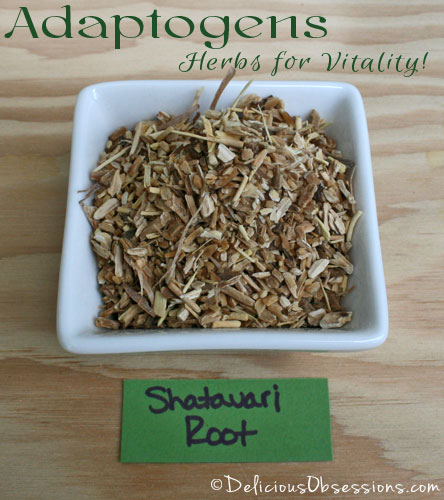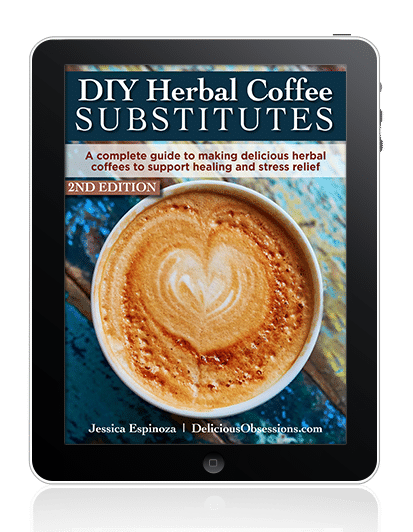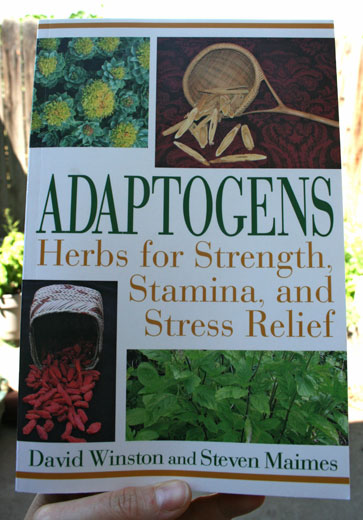FTC Disclosure: Delicious Obsessions may receive comissions from purchases made through links in this article. As an Amazon Associate I earn from qualifying purchases.Read our full terms and conditions here.
Welcome to another installment in my multi-part series, where I am discussing adaptogens and how I am using them to help me on my healing journey. You can read about my journey to health here. If you’re just tuning in to this series, you can read the following articles on the subject of adaptogens:
- Adaptogens: Herbs for Vitality – An Overview
- Adaptogens: Herbs for Vitality – American Ginseng
- Adaptogens: Herbs for Vitality – Schisandra Berries
- Adaptogens: Herbs for Vitality – Eleuthero Root
- Adaptogens: Herbs for Vitality – Astragals Root
- Adaptogens: Herbs for Vitality – Amla Fruit
- Adaptogens: Herbs for Vitality – Holy Basil
- Adaptogens: Herbs for Strength, Stamina, and Stress Relief: A Book Review
DISCLAIMER: Due to the FDA and FTC laws on health claims, I need to make this very clear. None of the information in this post is to be construed as medical advice. I am not a doctor or certified medical practitioner of any sort. I am simply sharing my own personal experiences, as I travel the long road to optimal health. Statements/products discussed have not been evaluated by the Food and Drug Administration (FDA) and are not intended to diagnose, cure, treat, or prevent any disease or illness. Every person is different and you should always consult your own certified health care practitioner before making changes to your current diet or before beginning any herbal or vitamin supplement regimen or exercise program.
Before we start in on , I want to share a few things that I have learned. While I am really excited about how much I have learned over the last year, I do realize that there are some limitations when it comes to being 100% self-taught about herbs, especially when you have specific health conditions you may be working on. I am currently looking for a local herbalist to work with, so that I can get the value of their clinical experience in dealing with patients. That said, I think that using herbs and getting started on your own is awesome and I strongly encourage it. You will be amazed at the vast amount of free information available and it’s exciting to know that you have the power to take care of your family’s health using holistic methods. I am not going to stop researching and reading and experimenting with herbs … working with an herbalist will just give me even more tools in my herbal toolbox!
Also, keep in mind that many herbs work best when they are paired with other compatible herbs. This is an area where an herbalist can really help, especially when it comes to more complex herbs. That said, I have enjoyed using the method of “simpling”, which means focusing on one specific herb over an extended period of time. This allows you to really get to know this herb, how it works, and how it can help you. Brigitte Mars, a renowned herbalist, says that the art of simpling allows you to “deeply connect with all the aspects of a plant’s power and to learn more about the unique flavor and properties of that individual plant.”(1)
Not all herbs are suitable for everyone. We are all unique beings and while the all of the herbs that I selected for this series fall into the “generally regarded as safe” category, it does not necessarily meant that they will work well for you. It’s always best to check with your doctor, naturopath, etc., before introducing new things into your diet or supplementation regimen. If you are pregnant or nursing, use extreme caution with herbs and always consult your physician before adding anything new.
Shatavari Root (Asparagus racemosus)
This was another adaptogen that I was not familiar with until I started researching this family of herbs. Shatavari is native to the tropical and subtropical regions of Malaysia, Africa, India, Northern Australia, and Southeast Asia. The root is the part of the plant that is used and the taste/energy is sweet, bitter, warm, and moist.(2) The plant has needle-like leaves and small white flowers. The look reminiscent of thin asparagus and are related to the common asparagus we love to eat (at least I love to eat!).
Shatavari has long been used in Ayurvedic medicine for it’s immune system boosting benefits, as well as to treat cancer and ulcers. It is one of the most important herbs in Ayurveda for women’s health and fertility and many classic sexual tonic formulas include shatavari root.(2,3) Even in modern Ayurvedic practices, shatavari is still widely used and animal studies have confirmed that it enhances libido and fertility. Other animal studies have shown that it may inhibit breast cancer and help boost immune system response.(2)
In 2009, there was a study published in the “Journal of Ethnopharmacology” that showed Shatavari to have significant immune boosting benefits on animal subjects. In 2006, there was a study published in the “Journal of Herbal Pharmacotherapy”, which found that in laboratory animals, there were dramatic anti-cancer benefits from this herb. In addition, Shatavari may have the following benefits:
- Improving gastrointestinal health
- Treating nervous conditions and anxiety
- Supporting liver function
- Reducing inflammation
- Restores hormonal balance and improved fertility in women and men
- Helps boost immune system and fight off infections and fecer
- Natural diuretic
- Improves resistance to stress
- Improves fatigue and energy levels
- Increases milk flow in lactating mothers
- Stimulates the pituitary gland
- Supports mucus membranes
In human and animal studies, it was found that this herb could help heal gastric ulcers and help prevent stomach irritation from aspirin therapies.(2)
How is Shatavari Root Used
Shatavari has not been shown to have any toxic side effects with long term use.(4) For some, the herb could cause or exacerbate diarrhea and abdominal bloating in those who are prone to those conditions.(2) The most common ways to use Shatavari are:
- Tinctures
- Decoctions
- Capsules
The reasons that I chose to try shatavari root were due to the herbs reported ability to reduce inflammation and improve gut health, as well as the hormonal balancing benefits.
I personally have been using Shatavari in teas. In Ayurveda, it is commonly taken mixed into warm milk or ghee. It is delicious mixed with a little coconut milk and ghee. I read somewhere (and now I can’t find it), that the fats in the milk actually help the Shatavari be better assimilated by the body.
Some have also said that you can infuse the root in oil and use it on various skin conditions. Like most of the other herbs I have featured in this series, I have not noticed a specific reaction to this herb, but adaptogens tend to work best over a long period of time and this is one of the newer herbs I have added to my routine.
Supporting a Your Stress Response, Adrenals, Thyroid, and Whole Body Through Herbs
When it comes to supporting overall wellness, herbs are a great tool to have in your toolkit, especially those who may be dealing with chronic illness of some type. Since 2009, when I started this site, I have met thousands upon thousands of people through my work and by far, the #1 health complaints are:
- adrenal fatigue (or adrenal dysfunction of some sort) (click here to read all of my adrenal health articles)
- thyroid disorders (hypo-, hyper-, or autoimmune) (click here to read all of my thyroid health articles)
Because of this, I wanted to add in a section into this post about the benefit of using herbs with chronic illness. Adaptogens are by far one of the most used herbs when it comes to working with people who have low energy, fatigue, and overall imbalance in the endocrine system (thyroid, adrenals, and blood sugar).
While the benefits of adaptogenic herbs extend far beyond just supporting that one system, this tends to be one of the main reasons people turn to adaptogenic herbs in the first place. That said there are a lot of other herbs out there that offer amazing support for the body, especially those dealing with chronic illness which is why I wanted to share this section today.
If you are dealing with any type of chronic illness, I’m sorry to break it to you, but caffeine may not be your best friend. 🙁 While you can find lots of info online in both the pro- and the anti-coffee camps, the fact of the matter comes down to the fact that are a lot of people dealing with chronic illness, especially thyroid and adrenal problems, that simply cannot tolerate coffee and caffeine.
While those with sluggish adrenal glands tend to feel run down and in need of a regular pick-me-up (like coffee and other caffeinated beverages), in the long run, caffeine can do more harm than good while you are healing. I go into the “whys” around caffeine and your adrenals in this detailed post here. In addition to the caffeine, there are other constituents, molds, and mycotoxins that can show up in coffee that some people find they react to and can further exacerbate the toxic load on the body.
When I was diagnosed with autoimmune disease and adrenal fatigue, one of the first things that had to go was coffee. In addition to dealing with these issues, we suspected that I was having some detox pathway sluggishness so we wanted to also focus on supporting the liver and lymph systems. Most people who are dealing with chronic illness are also going to have issues with detoxification of the body, which is why herbs can play such an important role.
To be honest, I never drank coffee because of the caffeine. I drank coffee for the taste and aroma, as well as the emotional experience I felt to my morning cup of joe. For me, it was a ritual that I looked forward to every day (and sometimes multiple times a day). Whether I was brewing it at home or going to my local coffee shops, the experience was one that I clung to tightly.
But, when I was faced with new health struggles, I knew I had to do whatever I could to support my body and give it the tools it needed to heal. Giving up coffee and caffeine was one step in this direction.
And it sucked.
I turned to the coffee substitutes on the market in a desperate attempt to recreate the ritual I had grown so fond of, but nothing ever tasted the way I wanted it to. Nothing ever gave me that same experience that my cup of “real” coffee did. I knew there had to be something better, but I simply could not find it on my health food store’s shelves.
Necessity is the mother of invention so that is why I created my own coffee substitutes. They were made with organic, sustainably harvested herbs with zero grains, zero gluten, and zero caffeine. Just herbs.
Herbs that not only tasted delicious but supported my body’s function, like liver detox, bile production, digestion, etc. All of the herbs used in my “coffee” blends have been used for thousands of years to support the body’s normal functions and help everything work a little better — something we all need in today’s toxic world! (psst, dandelion is one of the herbs!)
When it came to creating these blends, if I could get something to not only tasted amazing (and helped me recreate my dearly loved ritual), but also did amazingly supportive things for my body, then it’s a no brainer!
I sold these pre-made blends on Etsy for awhile and the demand was more than I could keep up with. People literally LOVED these blends and were stunned at how much like coffee they actually tasted. Customers who had been dealing with a variety of chronic illnesses had given up coffee to heal their bodies, but like me were deeply missing their morning cup of joe ritual.
After careful consideration and work with some highly experienced advisors, I decided to stop selling the pre-made blends and instead share my proprietary recipes in the form of an eBook. That way I could arm people with the knowledge and recipes they needed to make their own caffeine-free, gluten-free, grain-free blends in the comfort of their own home.
That is why I created the best-selling DIY Herbal Coffees eBook: A Complete Guide To Making Delicious Herbal Coffees to Support Healing & Stress Relief.
Now in its second edition, this ebook features:
- All of my proprietary herbal blend recipes to you can craft a homemade herbal cup of “coffee” at home.
- A ton of researched information about coffee’s impact on the health of those dealing with issues like adrenal fatigue, blood sugar dysregulation, autoimmune disease, thyroid disease, and any other chronic illness.
- Information about all of the herbs used, why I selected them, how to source them, how to prepare and store you “coffees”, and much more.
- Access to your own personal coffee shop where I show you how to recreate your favorite coffee shop drinks and pastries with wholesome, nourishing real food ingredients. No junk here. Only real food.
This book truly is a comprehensive guide to supporting your health, reducing your stress, and bringing a little something special back into your healing journey. You can learn more and download your own copy of this revolutionary wellness guide here, or simply click on the image below.
Further Reading
If you are looking for more info on adaptogenic herbs, I HIGHLY recommend this book, Adaptogens: Herbs for Strength, Stamina, and Stress Relief. It is one of my all-time favorite herb books and probably the one I reference the most. Find it on Amazon here.
Basic Herbal Preparations
If you’re new to herbs and are feeling confused about all the different preparations for them, don’t be! Let me help you out with this Basic Herbal Preparations post. You can also watch the videos below to learn more about a couple herbal preparations and about my favorite source for organic, sustainably harvested herbs.
Ready to Learn More?
Stay tuned for more herbal profiles! I will continue writing about the specific adaptogens that I am using in my healing journey. There are a lot of adaptogens out there, but the key is finding ones that work well for your needs.
If you like what you’ve read here, please keep in touch! You can subscribe to my semi-monthly newsletter or subscribe to email updates so you never miss a new post. You can also find me on Facebook, Twitter, Pinterest, and Google+. Have a question? Contact me here.
If you’re interested in learning more about herbs and would like to know who I recommend, check out my Resources page.
References
1. “The Desktop Guide to Herbal Medicine: The Ultimate Multidisciplinary Reference to the Amazing Realm of Healing Plants, in a Quick-study, One-stop Guide”, by Brigitte Mars. Basic Health Publications, 2007.
2. “Adaptogens Herbs for Strength, Stamina and Stress Relief”. David Winston and Steven Maimes. Healing Arts Press, 2007.
3. “Shatavari Root and Powder Profile“. Mountain Rose Herbs.
4. “Shatavari: Fertility Herb from India“. Natural Fertility Info website.
5. “Shatavari Root“. Buzzle.com
6. “Shatavari Root Benefits“. LiveStrong.com





2 Comments